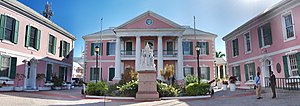
The Bahamas is a parliamentary constitutional monarchy headed by King Charles III in his role as King of the Bahamas. The politics of the Bahamas takes place within a framework of parliamentary democracy, with a Prime Minister as the Head of Government. The Bahamas is an Independent Country and a member of the Commonwealth of Nations. As a former British colony, its political and legal traditions closely follow those of the United Kingdom. King Charles III is the head of state, but executive power is exercised by the cabinet. Legislative power is vested in the two chambers of parliament. The Judiciary is independent of the executive and the legislature and jurisprudence is based on English common law. The multi-party system is dominated by the Progressive Liberal Party and the Free National Movement. The constitution protects freedom of speech, press, worship, movement, and association.
In the United Kingdom, the boundary commissions are non-departmental public bodies responsible for determining the boundaries of parliamentary constituencies for elections to the House of Commons. There are four boundary commissions: one each for England, Scotland, Wales and Northern Ireland.
The Free National Movement is a political party in the Bahamas formed in the early 1970s and led by Sir Cecil Wallace-Whitfield. The current leader of the party is Michael Pintard and the current deputy leader is Shanendon Cartwright.

Local government in the Bahamas exists at two levels: 32 districts and 41 towns. The boundaries of districts are defined by the First Schedule of The Bahamas Local Government Act 1996, defined with reference to parliamentary constituency boundaries. The Second Schedule lists 13 districts which are divided into town areas. Towns are governed by directly elected town committees. Second Schedule districts are governed by nine-person district councils composed of the chairs of the town committees, and if numerically required, additional people elected by the town committees. The 19 Third Schedule districts are unitary authorities which cannot be divided into towns. They are governed by nine-person district councils which are directly elected by voters. The powers of Second Schedule and Third Schedule councils are slightly different, and the Third Schedule district known as the City of Freeport has a slightly different list of enumerated powers.

Leicester South is a constituency, recreated in 1974, represented in the House of Commons of the UK Parliament from 2024 by Shockat Adam.
Elections in Australia take place periodically to elect the legislature of the Commonwealth of Australia, as well as for each Australian state and territory and for local government councils. Elections in all jurisdictions follow similar principles, although there are minor variations between them. The elections for the Australian Parliament are held under the federal electoral system, which is uniform throughout the country, and the elections for state and territory Parliaments are held under the electoral system of each state and territory. An election day is always a Saturday, but early voting is allowed in the lead-up to it.

Elections in the Bahamas take place in the framework of a parliamentary democracy. Since independence, voter turnout has been generally high in national elections, with a low of 87.9% in 1987 and a high of 98.5% in 1997. The current Prime Minister is The Hon. Philip Davis. The electorate is less than half of citizenry.

Elections in Barbados are held to choose members to fill elective offices in the House of Assembly. Elections are held on Election Day. These general elections do not have fixed dates, but must be called within five years of the opening of parliament following the last election. A former minister of the DLP, Warwick Franklin summed up the general elections process in Barbados as saying it is really just, "30 by-elections on the same day."
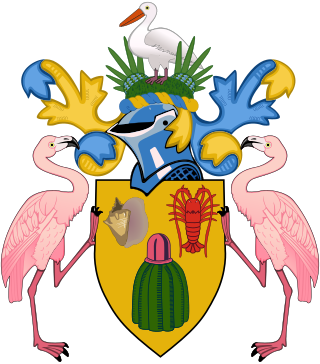
Politics of the Turks and Caicos Islands takes place in a framework of a parliamentary representative democratic dependency, whereby as of August 9, 2006 the Premier is the head of government, and of a multi-party system. The islands are an internally self-governing overseas territory of the United Kingdom. The United Nations Committee on Decolonization includes the Turks and Caicos Islands on the United Nations list of non-self-governing territories. Executive power is exercised by the government. Legislative power is vested in both the government and the Legislative Council.

Ynys Môn is a constituency of the House of Commons of the Parliament of the United Kingdom. It elects one Member of Parliament (MP) by the first past the post system of election. It is one of five 'protected constituencies' within the UK, with boundaries defined by the Parliamentary Constituencies Act 2020 to be to those of Isle of Anglesey County Council where there must be a whole number of MPs rounded up to the nearest whole number with these boundaries.

Clwyd South was a constituency of the House of Commons of the Parliament of the United Kingdom (Westminster). The constituency was created in 1997, and it elected one Member of Parliament (MP) by the first past the post method of election.
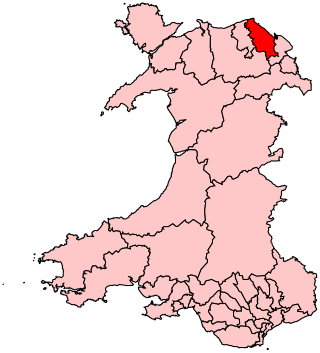
Delyn was a constituency in the House of Commons of the UK Parliament from 1983 to 2024.

The Parliament of the United Kingdom currently has 650 parliamentary constituencies across the constituent countries, each electing a single member of parliament (MP) to the House of Commons by the plurality (first-past-the-post) voting system, ordinarily every five years. Voting last took place in all 650 of those constituencies at the United Kingdom general election on 4 July 2024.

Aberconwy was a constituency represented in the House of Commons of the UK Parliament.

The House of Assembly of Barbados is the lower house of the bicameral Parliament of Barbados. It has 30 Members of Parliament (MPs), who are directly elected in single member constituencies using the simple-majority system for a term of five years. The House of Assembly sits roughly 40–45 days a year and is presided over by a Speaker.

Dwyfor Meirionnydd is a constituency of the House of Commons of the Parliament of the United Kingdom, held by Liz Saville Roberts of Plaid Cymru. The seat is bordered to the north by Bangor Aberconwy, to the south by Montgomeryshire and Glyndŵr, and to the east by Clwyd East. Until 2024, the seat shared the same boundaries with the Dwyfor Meirionnydd Welsh Assembly constituency, the latter of which still uses the borders established for the 2007 Welsh Assembly election.
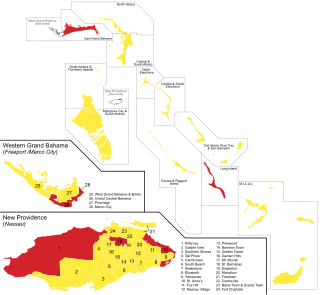
General elections were held in the Bahamas on 16 September 2021 to elect all 38 members of the House of Assembly.
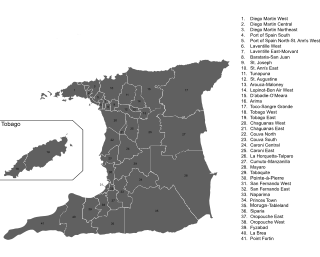
General elections will be held in Trinidad and Tobago by 2025 to elect 41 members to the 13th Trinidad and Tobago Republican Parliament. It will be the 100th anniversary of general elections in the country.
Killarney is a parliamentary constituency represented in the House of Assembly of the Bahamas created in 2007. It elects one Member of Parliament (MP) using a First past the post electoral system. The seat has been held by the Free National Movement and has had Hubert Minnis as its MP since its creation.

North Andros and Berry Islands is a parliamentary constituency represented in the House of Assembly of the Bahamas. It elects one member of parliament (MP) using the first past the post electoral system. It has been represented by Leonardo Lightbourne from the Progressive Liberal Party since 2021.

